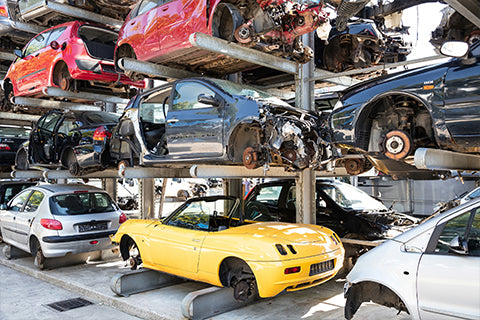Buying Salvage Cars at Auction can be a Lucrative Business
Posted by Alexandra Scott at

Some of the best deals out there are on cars that have been written off by insurance companies
Auto auctions can be fun and exciting. Finding the right vehicle for yourself or to flip can be a challenge, but it can also be rewarding. Auctions can generate great bargains, but often some of the best deals are overlooked by the average car auction buyer, who may be hesitant to purchase a salvaged vehicle.
What is a salvage vehicle?
A common misconception is that a salvage car is actually a junk or worthless vehicle. Nothing could be further from the truth. What it actually means is that the insurance company has deemed the vehicle to be a total loss, and they would rather pay out the value of the car to the owner than pay to have it fixed. The insurance company sets their own standards for what the criteria means in the long run but it affords a great opportunity for a bargain hunter at auction, especially one who knows his way around cars. If you are handy with tools and can do the repairs yourself, or you know someone who can do the repairs at a discounted price, this could end up being your most profitable route when it comes to flipping cars.
What is a salvage title, a salvage certificate and a rebuilt title?
If you are considering purchasing a salvage vehicle at auction or from a private seller, the most important thing to know is the difference between a salvage certificate and a salvage title.
A salvage title is a loose term in the industry but it basically means that the vehicle has already passed all the steps necessary for it to be deemed roadworthy. It is now the same as any car title, with the simple caveat that at one point in time it had been written off by the insurance company. This is a good thing, because you won’t have to jump through all the hoops required to change a salvage certificate into a salvage title and you can flip this car immediately, or as quickly as you get it fixed up enough to be profitable for you.
A salvage certificate is more complicated. Once a vehicle has been declared a total loss, the insurance company retrieves the title from the owner and applies for a salvage certificate from the DMV. Once the DMV issues the certificate the insurance company will then sell the vehicle at auction. The auction winner will receive this certificate as proof of ownership. The owner will then need to have the car cleared of multiple inspections, including brake, lamp and smog check inspection, as well as VIN verification, in order to get the vehicle registered in their name. Once fees are paid, the owner will then receive a salvage title by mail usually within 30 days. It is much more of a process and one should be aware of that before making their purchase.
Another great option is finding a vehicle with a rebuilt title. This is issued by the state or jurisdiction and it denotes that all repairs to the vehicle have been made and the car is for all intents and purposes fixed, with no additional repairs needed. If these cars have been rebuilt properly they will be at a quality that is near factory standard, only with a lower resale value. This could make it a huge bargain, and possibly the exact deal you have been looking for.
Can you make money flipping a salvaged vehicle?
The profit margin for a salvage vehicle can often be much greater than the profit margin for any other car you try to sell. The only issue you need to watch out for when purchasing a car with a salvage title is the reason the vehicle was salvaged. A vehicle is salvaged by the insurance company after it had been in an accident. This may scare off many potential buyers, but the accident may not have been all that serious, especially if the vehicle is older. This is why getting a vehicle’s CarFax and having a qualified mechanic check the vehicle out before you make your purchase is so important. Now, more than ever, mistakes missing paintwork can be costly. In an uncertain economy and market, you need to be sure what you are buying.
How do you determine the value of a salvaged vehicle?
Unfortunately, there are no hard and fast rules in this area. There is no standard formula to use as a guideline, as different insurance companies have different criteria. The basic valuation is determined by how much damage has been done to the car, and how much it would cost to fix that damage in proportion to the current value of the car. The newer the vehicle, the more damage it would take for the car to be written off as a total loss. An older car, however, may be written off for something as simple as a minor collision or fender bender.
A good rule of thumb is to start with the Kelley Blue Book retail value of the car, which is basically what the car cost brand new off the lot. Then, divide that number in half. This will give you a ballpark figure to work with. Compare that number with the vehicle’s current market value, or the value determined by the insurance company. If you factor in the cost of repair and allow for a reasonable profit you can determine how much you should be willing to pay for that car at auction, and not go over. That way, you can assure that you can flip the vehicle without losing money in the deal. Remember, some buyers will be hesitant to purchase a vehicle that had once been in an accident, so be sure to price it accordingly.
For example, a vehicle’s value will drop 30% once the car has been repaired, no matter how good that repair may be. If the vehicle is still damaged, it could be worth as little as 10% of what a comparable, never damaged vehicle is worth. These can be tough margins to figure out, which is why having a knowledgeable mechanic by your side is such a valuable asset. Remember, not all damage gets reported so make sure you have your FenderSplender Paint Meter on hand to determine if there have been other repairs that might not have been obvious to the naked eye. Sometimes what initially may seem like a good vehicle just isn’t worth the trouble, or the repair cost could be prohibitive. In which case, selling the car for scrap or parts may be the only viable decision to make.
How do you sell a car for scrap?
Wherever you live in the country, there are companies that will purchase your junk vehicle. They will usually handle all the paperwork for you and tow the car away. These companies will strip out the parts they think they can use and convert what is left into scrap metal. These companies usually pay cash and take a lot of the hassle and headache away from vehicle removal and disposal. A quick Google search of “junk car buyers” or “cash for cars” near you will generate good results. Call around and make sure you are getting the best deal for your vehicle.
Now, more than ever, mistakes missing paintwork can be costly. In an uncertain economy and market, you need to be sure what you are buying.




